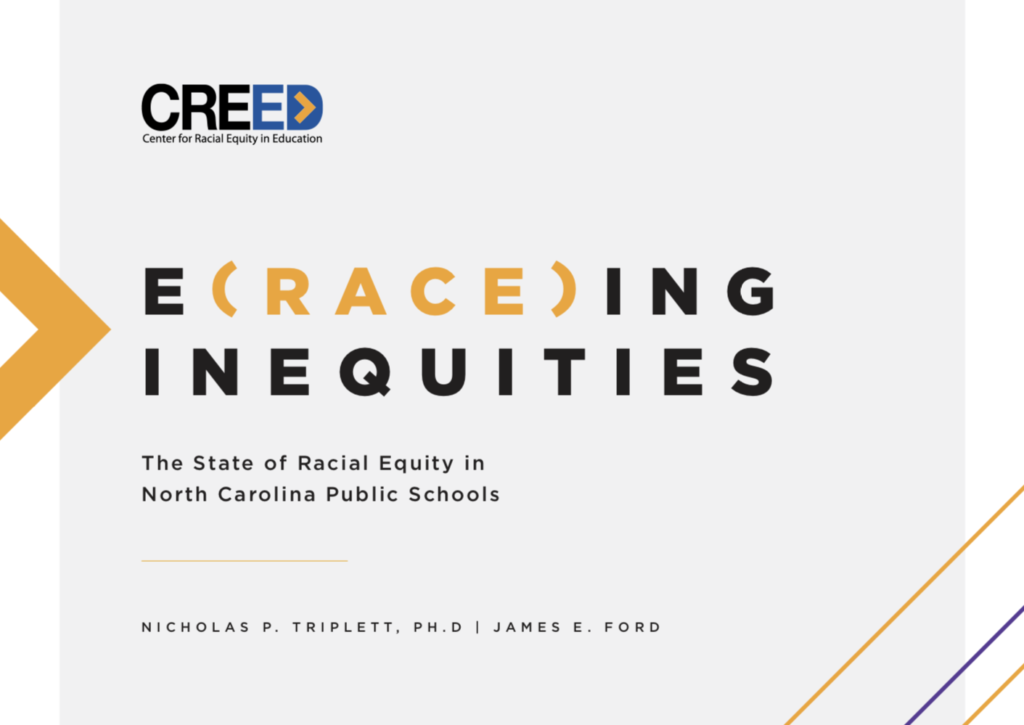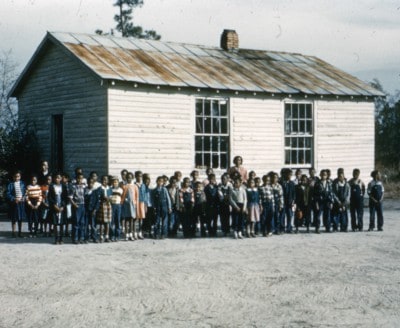
This year, Durham-based MDC chose nine organizations to join a program called “Learning for Equity: A Network of Solutions” — or LENS-NC. The program aims to improve outcomes for students at the intersection of race, income, and learning differences. This article on CREED’s work centering race in education is part of a series introducing our readers to these nine organizations.
Editor’s note: Through a grant from the Kenan Charitable Trust, James Ford was on contract with the N.C. Center for Public Policy Research from 2017-2020 leading a statewide study of equity in our schools. The Center is affiliated with EducationNC. Ford launched the Center for Racial Equity in Education (CREED) during the grant, and he now serves as the executive director.
Janeen Bryant and James Ford wanted to work at a place that spoke aloud about all the ways race shows up in education — a place that worked to close race-based opportunity gaps.
They just couldn’t find it. “There were places where it was part of their work, but not the centerpiece,” Ford said.
“If it’s not there, we had to build it.”
That seed has grown into the Center for Racial Equity in Education, known as CREED.
CREED conducts race-conscious research that interrogates how race shows up in schooling. Alongside the research, it engages people in the community who care about disrupting a system that isn’t working.
Then, it goes one step further — to actually do something about it.
A partner in prioritizing race in education
The idea that became CREED started forming after Ford traveled the state five years ago as North Carolina’s teacher of the year.
As a social studies teacher at Garinger High School in Charlotte, he knew something was happening to his Black and Brown students. It showed up in how they were treated, how they felt at school, and the opportunities they were given (or not given).
Traveling the state, he realized the problem was pervasive. He started talking and writing about it.
“It was not a welcome conversation at the time,” Ford said.
Ford wanted to create a place that centered this conversation but went further, to tackling the problem. He knew he couldn’t do that alone.
A man of faith, Ford prayed. And Bryant’s name popped into his head.
Bryant met Ford when Ford was speaking about systems of white supremacy years ago. She was surprised at the directness of his message and his willingness to speak unpopular facts, she recalled. They connected and stayed in touch.
When Ford contacted her about his idea almost two years ago, she was designing programs, curriculum, and discussion opportunities through her consulting firm. But she felt her work wasn’t complete.
“I could not tie that directly to, ‘What do we do about it?’,” she said. “My whole career journey has been looking for a place where I can come as a whole person.”
CREED was that opportunity. A way for each of them to create the work they had long wanted to do.
“I get to show up in a space, work with someone else who is also aligned and really drive toward impact and action,” Bryant said. “I don’t want to talk about it anymore — I want to be about it.”
Race-conscious work and reciprocal engagement
The first set of research CREED did looked exhaustively at race and education in North Carolina.
The Deep Rooted report provided historical context. Its companion report, E(race)ing Inequities, provided quantifiable evidence for what they had long felt was true.

Other studies had presented some of the findings CREED published, but none was as comprehensive. Or as singularly focused on intentionally examining and centering race.
“To be race-conscious means to see color intentionally as it pertains to the research,” Ford said. “It means to include it as a variable — a central variable — not to mix it with socio-economics, not to mask it in cultural assumptions. It’s to deliberately look at race as a factor and a variable in empirical research.”
Bryant and Ford traveled the state, presenting their findings at some of the many convenings CREED has organized over the past year to engage with community.
People aren’t just showing up to hear what Bryant and Ford have to say, though.
“The community engagement cycle that I come from always listens to community first,” Bryant said. “James was doing the research, and while he was doing the research we were checking in with community to see if it resonated with them. We were getting feedback about the research while he was doing the research. It’s reciprocal.”
Now, and in response, CREED provides a comprehensive array of engagement opportunities:
- CREED Academy provides professional development, training equity-minded educators and building critical consciousness for stakeholders,
- The REWire, a monthly email newsletter, curates race and education news, views, and research,
- On The Margin, a podcast available on Apple and Spotify, is about capturing the often untold stories of educational equity in North Carolina, and
- TeachingInColor is a professional learning network (PLN), including webinars and chats on Twitter @TeachInColorNC #TeachingInColor.
Through this reciprocity and engagement, something more was born. Belonging.
“It’s so refreshing to be in a space where someone says, ‘Yes, I see it, too,'” said Tinisha Shaw, a Guilford County educator who was drawn to CREED’s work through a Teaching in Color convening. “It feels freeing. It’s liberating.”
Moving beyond research and talk to racially equitable practices
While CREED’s research and convenings have empowered and engaged communities, the goal has always been to close the “knowing-doing” gap.
CREED has worked with dozens of districts on learning and development. It has had extensive relationships with three public school units, providing coaching on how to implement equitable policy.
“We never wanted to be a think tank,” said Ford, quickly adding that he think tanks fill a necessary role. “We’re not a think tank. We’re an educational research-to-practice organization. So when Janeen talks about doing, that was always the angle.”
Tinisha Shaw is a social-emotional learning specialist in Guilford County Schools. CREED’s focus on action immediately got her attention.
“I was like, yes, I’ve been looking for this,” she said. “I’ve been looking for a space where [there were] people with common ideas about education and who wanted to do something about it. Not just talk about it and complain, but actually get together and organize to transform the system.”
When Shaw speaks, you can hear how personal this is to her. It’s that way for CREED’s co-founders, too. They are both parents and say they are deeply committed to the state’s students — Black, Brown, Indigenous, white, Asian — all of them.
“This is not some theoretical abstract for us,” Bryant said. “This is real. When I talk about urgency, I mean that this is urgent for us, personally.”
Building coalition
The work is personal for thousands of others across the state. One of CREED’s biggest efforts is bringing these thousands together to build coalition.
CREED launched its Freedom Hill Coalition this year. Named after the first settlement in the country established by formerly enslaved people, a settlement in present-day Edgecombe County, Freedom Hill Coalition is a statewide organization of change-makers.
The coalition will help inform CREED’s efforts. The hope is also that the coalition can be vocal at all levels of education — in schools, districts and state government.
CREED held its first large-scale convening of Freedom Hill Coalition virtually in June. The movement has grown to 350 members who are now organizing locally and also engage with one another on Twitter — using the #IStandOnFreedomHill hashtag.
“It is my sincerest desire that Freedom Hill grows into a formidable force of public-facing, respected and organized individuals and organizations that are pushing an agenda for racial equity,” Ford said. “I hope we will be able to look back after the next year and see significant changes in policy.”
Shaw, who is organizing a Freedom Hill group in the Piedmont Triad area, doesn’t think these desires are far-fetched.
She said she believes that Ford and Bryant are the right leaders for this moment, and that the way they are building a network is rooted in successful movements of the past.
“James and Janeen are really building on the tradition of the civil rights movement,” she said. “They’re building coalition and listening to the past and really connecting with the community. I appreciate that they’re bringing that tradition back. It can really have an impact on North Carolina — and on the country.”



